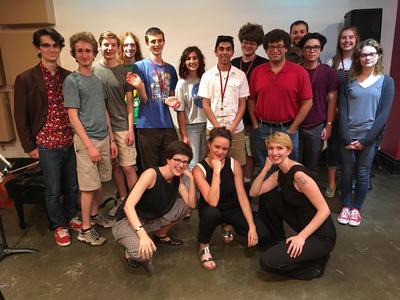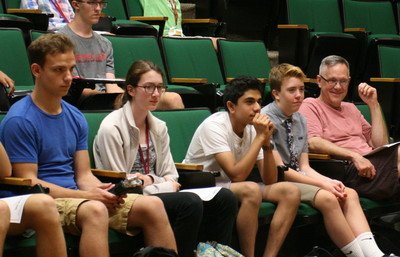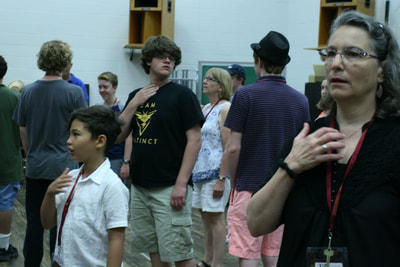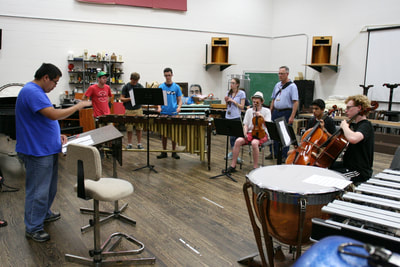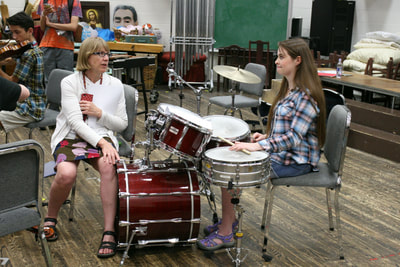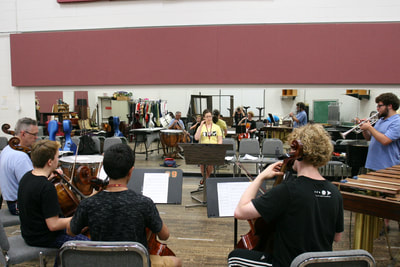Advocacy
He has served on the staff and/or boards of five national composer service organizations (1978-2003): Minnesota Composers Forum, American Composers Forum, Meet the Composer, New Music USA, and the American Music Center. Originally proposing the consolidation of these groups, it eventually occurred when New Music USA took over publication of the new music journal NewMusicBox and the funding programs of the American Music Center; the American (formerly Minnesota) Composers Forum took on the national membership services formerly run by the AMC.
@ Composers Institute
Composers Institute is a Minnesota nonprofit with a number of one-week intensive "institutes" for composers young and old held online or on the banks of the Kinnickinick River on the University of Wisconsin-River Falls campus. Randall has once again taken leadership in 2021 after a stint 2003-2016. During the July institutes, he teaches daily composition lessons, music theory and repertoire.
In 2020, because of the Covid-19 pandemic, Composers Institute pivoted to online, becoming Composers Online Institute (COI), a 100% online creative intensive for composers of any age. The big innovation was to focus the creative process on DAWs (digital audio workstations). Projects employed professional performers and digital media. More information about COI and all the other programs at Composers Institute can be found at their website.
In 2020, because of the Covid-19 pandemic, Composers Institute pivoted to online, becoming Composers Online Institute (COI), a 100% online creative intensive for composers of any age. The big innovation was to focus the creative process on DAWs (digital audio workstations). Projects employed professional performers and digital media. More information about COI and all the other programs at Composers Institute can be found at their website.
|
As Executive Director, Randall shapes the "Composers Institute experience" by challenging students to master musical 1) literacy, 2) fluency, 3) self-expression, and 4) team-work. These four challenges define the experience for both the faculty and the students. Every student is expected to...
|
CI faculty are available to perform and read compositions. A special opportunity is offered to registrants to compose a work prior to camp for professional musicians (e.g. vocal ensemble, chamber ensemble or large ensemble) which is then given a reading on the first day of each week.
Composers Institute holds songwriting and composing as equal forms of musicking. The cultural position that "high" and "low" arts is different in nature and in form does not apply at CI. "Songwriting" faculty are equal to "Composing" faculty and are inter-changeable depending on registrants' interests. As a result, students have access to all of the faculty members as performers, teachers and coaches during an institute. |
@ MacPhail Center for Music
Randall Davidson offers private composition instruction at MacPhail in downtown Minneapolis and also is on the faculty of the June "Comp Camp" directed by Dr. Sarah Miller and created for young musicians (age 8-17) interested in exploring music composition.
@ Minnesota Composers Forum
Randall served as a Managing Composer along with his colleagues Stephen Paulus, Libby Larsen and Monte Mason, from 1977-1988. He collaborated with them to design, launch and administer the Composers Commissioning Program funded by Jerome Foundation which continues to this day as the J-Fund Commissions. He edited the MCF's newsletter, kept membership records and published the Forum's directory for eleven years from 1977-1988. Along with his other co-managing composers, they hosted the 1984 Lyman Conference which was the first of its kind for composer service organization from around the country. More of the story to come...
@ American Composers Forum
The name for the ACF was the product of the fertile imagination of composer Stephen Paulus. At the time, we imagined that a logo might be a buffalo or some other image from nature that would evoke the Great Plains. At the time, there was already a number of important and historical composer service organizations operating in the U.S. Many of them are now memories but some are vital members of the wider community of inventive and creative music-makers: NAC/USA, American Composers Alliance, New Music America, the International Alliance for Women Composers, the International Society of Contemporary Music, New Music USA (formerly Meet the Composer), the Society of Composers, Inc, and the list continues to ebb and flow.
Randall was one of the first presidents of the newly re-formed board.
The web address (composersforum.org) would have belonged to the Composers Forum, Inc. which was based in New York City and lead by the remarkable force-of-nature, composer Bernadette Speach. The Composers Forum flourished in the interregnum between the World Wars and served the wider community with distinction from 1935-2002. But as is the case with so many corporate histories, not everything you can know from the internet tells the real history. And...y'know, Ozymandias. Again, more of the story will come...
Randall was one of the first presidents of the newly re-formed board.
The web address (composersforum.org) would have belonged to the Composers Forum, Inc. which was based in New York City and lead by the remarkable force-of-nature, composer Bernadette Speach. The Composers Forum flourished in the interregnum between the World Wars and served the wider community with distinction from 1935-2002. But as is the case with so many corporate histories, not everything you can know from the internet tells the real history. And...y'know, Ozymandias. Again, more of the story will come...
@ American Music Center
The American Music Center was founded in 1939 but a group of composers trying to find some legitimacy for their music. At first, the idea was to house a number of scores at college music libraries and college book stores (mostly in New England) but eventually they were persuaded to create a "government sanctioned" nonprofit organization that would collect and promote music by American composers. Aaron Copland is often given credit for founding the AMC (as it was called) and the offices were established in Manhattan, home of so many of the publishers of serious concert music.
Randall served as president for two terms and an additional year as the organization moved its collection of 65,000 scores to the New York Public Library. Before the paper scores were moved, the AMC was one of the first music organizations in the U.S. to place the data online. That database is maintained at this point by New Music USA (formerly Meet the Composer) but access to the scores is still possible at the NYPL Lincoln Center in Manhattan thanks in large part to the influence of Ms Jean Bowen (Bloch), chief of the music division at the NYPL. Much of its operations, funding and programs were divided up in 2011 between the American Composers Forum (all of the members of the AMC became members of the ACR) and Meet the Composer which became New Music USA. But there is more to this story, too.
Randall served as president for two terms and an additional year as the organization moved its collection of 65,000 scores to the New York Public Library. Before the paper scores were moved, the AMC was one of the first music organizations in the U.S. to place the data online. That database is maintained at this point by New Music USA (formerly Meet the Composer) but access to the scores is still possible at the NYPL Lincoln Center in Manhattan thanks in large part to the influence of Ms Jean Bowen (Bloch), chief of the music division at the NYPL. Much of its operations, funding and programs were divided up in 2011 between the American Composers Forum (all of the members of the AMC became members of the ACR) and Meet the Composer which became New Music USA. But there is more to this story, too.
@ Meet the Composer/New Music USA
More to come...
